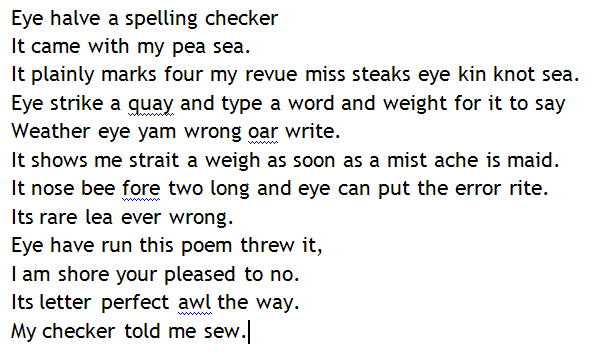Update: People Still Smarter than Computers!
Jonathan & Margaret over on the Word blog have some nice words about the contextual spellchecker. They mention a well-known (but anonymous) poem, “Ode to My Spell Checker”--just the sort of thing the contextual spellchecker ought to handle, you might think? Well, let's take a look:

Whoops! Only four errors caught? And one of them isn't even right (the contextual speller suggests "for" in place of "four")! Can this feature really be any good if it only catches four of these errors?
The answer is, "sure!" Several of us here enjoy this poem in all the many versions you can find floating about the web, and we've thought of it often while building the contextual speller. But we never intended to build a spell checker that could entirely "fix" this poem. Instead, we built a feature that was designed to help with the kinds of errors people actually make when typing. People virtually never accidentally write "eye" when they mean "I" or "sew" when they mean "so"--that only happens when someone is being deliberately clever, as this poem's author clearly was. Of course it's still pretty easy for a clever person (especially one who has a deep knowledge of the spelling and sound of English, such as our anonymous author) to outwit a piece of language-processing technology. This just in: People are still smarter than computers (thank goodness).
What the contextual spellchecker is smart at is detecting whether a word is improbable in a given context ("all the way" is much more likely than "awl the way"), but it needs enough well-formed context to do its job. "Miss steaks eye kin knot sea" is just a very strange string of words for someone to type--too strange for the checker to make any reasonable guesses about what the author meant. And anyway, if you accidentally type "miss steaks eye kin knot sea" when you meant "mistakes I cannot see", then I'm afraid you've got bigger problems than any spellchecker can handle J
-- James Lyle (Test Lead)